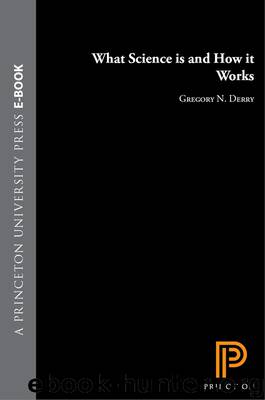What Science Is and How It Works by Derry Gregory N.; Derry Gregory N. N.;

Author:Derry, Gregory N.; Derry, Gregory N. N.;
Language: eng
Format: epub
Publisher: Princeton University Press
Published: 2013-04-14T16:00:00+00:00
New Technologies
Many of the important issues can be illustrated by looking at a specific case: molecular biology and genetics. Rather than looking at future scenarios of human clones, let’s consider the implications of some procedures that are present-day realities. A number of diseases are inheritable, such as Huntington’s disease, phenylketonuria, and sickle cell anemia. People with family histories of such genetic diseases are obviously at higher risk for having them. Until recently, however, there was no way to know whether an at-risk individual actually had the condition until the onset of symptoms (which may occur late in life, as in Huntington’s disease for example). Scientific advances in our knowledge of genetics now allow us to identify particular genes (or groups of genes) as being responsible for some of these diseases, so we now have the technological ability to tell someone whether or not a condition exists long before any symptoms become evident. Is this a good thing? The ability to determine whether an individual has a genetic disease opens up a range of ethical dilemmas. Unless we have a treatment for the condition, the person might well prefer not knowing. If a doctor knows, is it ethical to withhold the information from the person (or, for that matter, to not withhold it)? If an insurance company finds out, it might refuse to issue health or life insurance; how should society handle that problem? If the person is a minor, who should determine whether a test is performed, the person or the parents? If the test can be performed prenatally (which is often the case), the issues become even more complex due to the possibility of abortion if the genetic condition is detected. Many examples of this sort can be found in the biomedical field. New techniques, for example, now allow us to prolong life far longer than ever before. Few people would argue that this is not good, but even this generally positive outcome of scientific progress opens up some difficult questions. At what point is it proper to allow a suffering and terminally ill person to die? How much of society’s scarce resources should be used for the expensive process of keeping very old and very ill people alive, as opposed to improving health care for babies and young children? The issues involved in such questions go far beyond the science and technology that provide the new techniques.
Biomedical applications are not the only technologies that raise issues of values and ethics. In chemistry, for example, the technological goal is often to produce some useful new substance. These substances can be powerful agents to benefit society, but they can also do unintended harm. Chemists have created new pesticides and fertilizers, allowing highly improved agricultural yields. Feeding more people is certainly good. The gains have been accompanied by serious side effects, however, such as environmental pollution and toxic effects on humans and wildlife. Weighing the positive and negative effects on humanity in a case like this depends at least in part on our values as well as our scientific knowledge.
Download
This site does not store any files on its server. We only index and link to content provided by other sites. Please contact the content providers to delete copyright contents if any and email us, we'll remove relevant links or contents immediately.
Enlightenment Now: The Case for Reason, Science, Humanism, and Progress by Steven Pinker(6869)
A Journey Through Charms and Defence Against the Dark Arts (Harry Potter: A Journey Through…) by Pottermore Publishing(4720)
The Immortal Life of Henrietta Lacks by Rebecca Skloot(4248)
A Journey Through Divination and Astronomy by Publishing Pottermore(4247)
Elon Musk by Ashlee Vance(3852)
Origin Story: A Big History of Everything by David Christian(3470)
COSMOS by Carl Sagan(3346)
Alchemy and Alchemists by C. J. S. Thompson(3292)
Enlightenment Now by Steven Pinker(3269)
Shadow of Night by Deborah Harkness(3169)
Inferior by Angela Saini(3146)
A Mind For Numbers: How to Excel at Math and Science (Even If You Flunked Algebra) by Barbara Oakley(3102)
Bad Pharma by Ben Goldacre(3091)
Origin Story by David Christian(2990)
Signature in the Cell: DNA and the Evidence for Intelligent Design by Stephen C. Meyer(2875)
The Code Book by Simon Singh(2854)
The Elements by Theodore Gray(2851)
A Brief History of Time by Stephen Hawking(2819)
A Journey Through Potions and Herbology (A Journey Through…) by Pottermore Publishing(2770)
